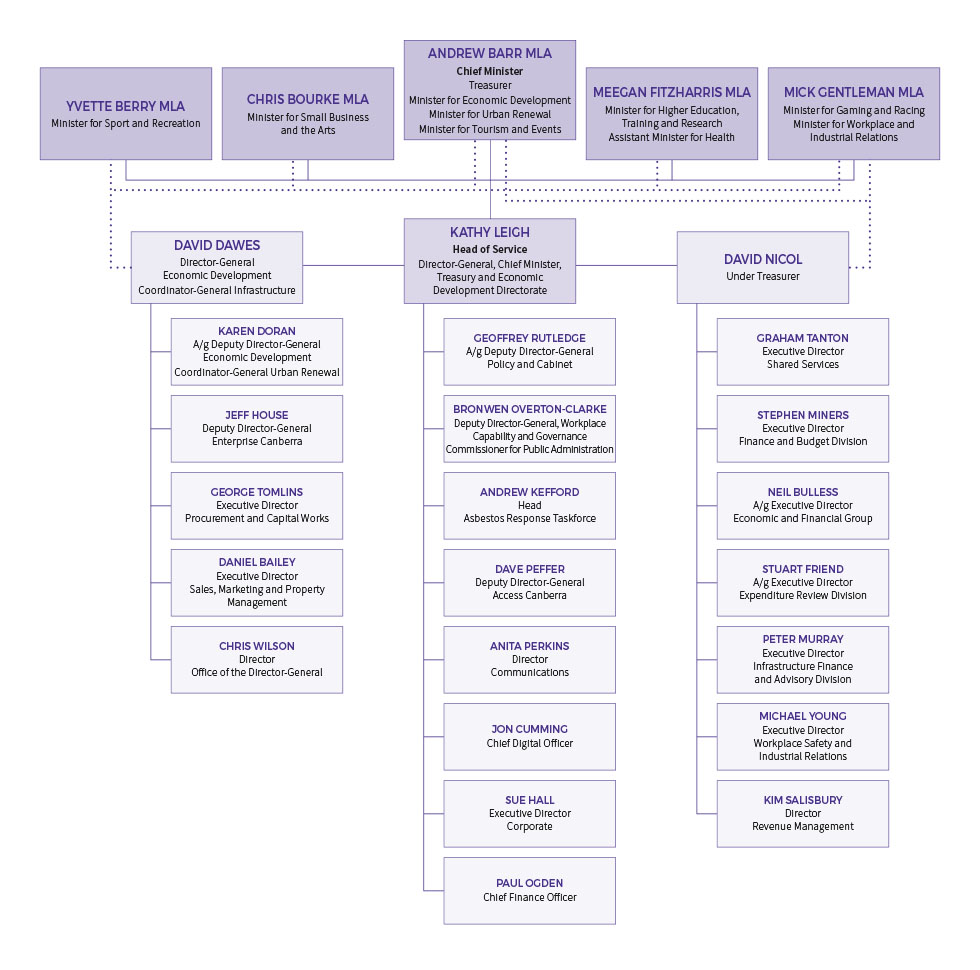Organisational Structure
CMTEDD operates under three streams:
- the Chief Minister stream, headed by the Director-General CMTEDD;
- the Treasury stream headed by the Under Treasurer; and
- the Economic Development stream headed by the Director-General, Economic Development.
In August 2015, the Office of the Chief Digital Officer was created within the directorate, with the appointment of Jon Cumming as the ACT’s first Chief Digital Officer. In January 2016 responsibility for Training and Tertiary Education and the National Arboretum Canberra was transferred to the directorate from the then Education and Training Directorate (now Education Directorate) and the Territory and Municipal Services Directorate (now Transport Canberra and City Services Directorate) respectively.
The responsibilities of the CMTEDD Executives as at 30 June 2016 included:
Director-General and Head of Service – Ms Kathy Leigh
The Director-General provided high level strategic advice to the Chief Minister and was Secretary to the Cabinet. As Head of Service the Director-General provided whole of government leadership and strategic direction to the ACTPS including through chairing the Strategic Board.
Chief Minister Stream
Deputy Director-General, Policy and Cabinet (Output 1.1) – Mr Geoffrey Rutledge (Acting)
The Policy and Cabinet Division supported the Chief Minister, as Head of the ACT Government and Chair of Cabinet, and the Director-General, as Head of Service and Chair of Strategic Board. It provided leadership across the ACTPS by ensuring the ACT Executive was provided with timely, frank and objective advice to support informed decision-making and provided a high level of responsiveness to the requirements of the Cabinet and the Assembly.
Deputy Director-General, Workforce Capability and Governance and Commissioner for Public Administration (Output 1.2) – Ms Bronwen Overton-Clarke
Workforce Capability and Governance Division supported the development and strategic capability of the ACT Public Service’s workforce to deliver on Government priorities. Leadership initiatives during the year were targeted to increase mobility and create an agile, responsive, innovative and collaborative ACT Public Sector Workforce.
The division was responsible for ACT public sector employment legislation, conditions and industrial relations.
The division also provided support to the Head of Service, the Commissioner for Public Administration, and the Strategic Board and its subcommittees.
Director, Communications (Output 1.4) – Ms Anita Perkins
Communications coordinated directorate communications activities, including media releases, speeches, branding, community engagement, electronic and hard copy communications products, advertising and the provision of public affairs advice. The Branch also provided media support to the Chief Minister’s office and coordinated whole of government media and communications projects.
Head, Asbestos Response Taskforce (Output 9.1) – Mr Andrew Kefford
The Asbestos Response Taskforce provided policy advice to Government to enable a coordinated and compassionate response to the lasting impacts of loose fill asbestos in Canberra homes. It provided a single point of contact for those in the community affected by, or having concerns about, loose fill asbestos. The Taskforce managed the delivery of the Loose Fill Asbestos Insulation Eradication Scheme. It also provided technical and regulatory advice to Government and the community in relation to asbestos.
Deputy Director-General, Access Canberra (Output 10.1) – Mr Dave Peffer
Access Canberra led the Government’s program of regulatory reform and drive to reduce red tape by trialling new service delivery models to help make it as easy as possible for Canberrans to interact with government. Access Canberra had a particular focus on helping local entrepreneurs understand and comply with the regulations applying to establishing a new business or holding an event, while ensuring at all times that public safety is maintained.
Executive Director, Corporate – Ms Sue Hall
Corporate provided a range of strategic, governance, organisational development, administrative and human resource functions for CMTEDD and the ACT Executive. The Executive Director was also the CMTEDD Senior Officer Responsible for Business Integrity and Risk.
Chief Finance Officer – Mr Paul Ogden
Strategic Finance was responsible for the financial and budgetary management of CMTEDD, and the ACT Executive.
Treasury Stream
Under Treasurer – Mr David Nicol
The Under Treasurer was responsible for the provision of strategic financial and economic policy advice to the Government with the aim of promoting the Territory’s financial position and economic management. The Under Treasurer also played a leading role in promoting accountability and transparency in the delivery of services to the community.
Executive Director, Workplace Safety and Industrial Relations (Outputs 1.2 and 1.3) – Mr Michael Young
Workplace Safety and Industrial Relations was responsible for the management of the ACT private sector workers’ compensation scheme, including policy, legislation and the supervision of the ACT Default Insurance Fund.
It managed the ACT Government accident and incident data repository, and was responsible for the management and prevention of workplace injuries in the ACT Public Sector and the development and implementation of the ACTPS Workers’ Compensation and Work Safety Improvement Plan.
Executive Director, Economic and Financial Group (Output 2.1) – Mr Neil Bulless (Acting)
Economic and Financial Group provided analysis and advice to the Government and agencies on a range of economic, regulatory reform and taxation matters, prepared economic and revenue forecasts, oversaw appropriate intergovernmental financial arrangements, managed the Government’s financial framework and insurance policy, and managed financial assets and liabilities, including superannuation liabilities and investments.
Executive Director, Finance and Budget Division (Output 2.2) – Mr Stephen Miners
Finance and Budget Division was responsible for advising the Government and agencies on both the development of the Territory’s Budget and financial issues relating to agencies and the Territory.
Executive Director, Expenditure Review Division (Output 2.2) – Mr Stuart Friend (Acting)
Expenditure Review was responsible for reviewing selected services and functions as determined by the Government.
Executive Director, Infrastructure Finance and Advisory Division (Output 2.2) – Mr Peter Murray
The Infrastructure Finance and Advisory Division brought together specialist capability in the support of selection, funding, implementation, delivery and whole-of-life transaction management of complex and major infrastructure projects.
Director, Revenue Management and Commissioner for Revenue (Output 3.1) – Mr Kim Salisbury
Revenue Management was responsible for providing advice on revenue and taxation policy, management of the Territory’s taxation base including the development of revenue and taxation legislation, compliance activities, debt management, administering the Territory’s rates and land tax including valuations, remissions and rebates (pensioners), administering the First Home Owner Grant Scheme in the ACT and administering the Home Loan Portfolio.
Executive Director, Shared Services (Outputs 4.1, 6.1 and 7.1) – Mr Graham Tanton
Shared Services provided tactical and transactional finance and human resource services, publishing, mailroom and record services and holistic ICT services to ACT Government Directorates.
Economic Development Stream
Director-General, Economic Development, Chief Executive Officer, Land Development Agency and Coordinator-General, Infrastructure – Mr David Dawes
The Director-General, Economic Development was responsible for leading the Economic Development Stream and implementing major Government initiatives. He also held the role of the Coordinator-General Infrastructure, with responsibility for:
- coordinating government response to high value/complex investment/development inquiries and proposals from the private sector; and
- undertaking cross-government coordination of complex delivery activities as requested by the Minister or Strategic Board.
The Director-General, Economic Development was also the Chief Executive Officer of the Land Development Agency (LDA). Information regarding the Director-General’s responsibilities in this regard can be found in the LDA’s Annual Report, available at www.lda.act.gov.au.
Deputy Director-General, Land Development Division, Coordinator-General, Urban Renewal and Deputy Chief Executive Officer, Land Development Agency (Output 8.1 and 8.9) – Ms Karen Doran (Acting)
The Land Development Division was responsible for government land release for the affordable and sustainable development of the ACT. This included high level strategic land policy, sales and financial matters, coordination of complex projects and direct land sales.
The Division provided strategic advice and support for the directorate and Ministers on land policy and strategy, economic development policy, gambling and racing policy, and the management of government owned and leased property.
Deputy Director-General, Land Development Division is also the Deputy Chief Executive Officer, LDA. Information on the activities of the LDA can be found in the LDA’s Annual Report, available at www.lda.act.gov.au.
Deputy Director-General, Enterprise Canberra (Output 8.2, 8.3, 8.4, 8.5, 8.6 and 8.8) – Mr Jeff House
Enterprise Canberra’s mission was to improve the liveability and productivity of the city. Working in collaboration with business, education institutions and industry partners, the division:
- developed and grew emerging enterprises, entrepreneurs and sectors to expand our economic base, provide local jobs and grow our export capability;
- promoted Canberra to the region, the nation and the world to attract visitation, business investment and students;
- nurtured grass roots sports and elite athletes and moulded our reputation as a centre of regional sporting excellence;
- produced major events for our city and managed significant arts, sports and event infrastructure;
- grew our arts ecology so that it is valued locally, nationally and globally as one that underpins our city’s liveability; and
- provided higher and vocational education accessible to all to increase skills of workers, provide better employment outcomes for business and identify future training requirements to develop the ACT economy.
During the reporting period the Division was renamed Enterprise Canberra in place of Arts, Business, Events, Sport and Tourism, with its branches also being renamed as follows:
- Innovate Canberra, formerly Innovation, Trade and Investment;
- Active Canberra, formerly Sport and Recreation Services;
- Cultural Canberra, formerly artsACT, Events ACT and National Arboretum Canberra;
- VisitCanberra (no change);
- Venues Canberra, formerly Territory Venues; and
- Skills Canberra, formerly Training and Tertiary Education.
Note responsibility for Output 8.5 Venues transferred to the Executive Director, Sales, Marketing and Property Management in July 2016.
Executive Director, Procurement and Capital Works (Output 5.1) – Mr George Tomlins
Procurement and Capital Works was the ACT Government’s centre of expertise for procurement matters. It provided procurement-related services to ACT Government agencies and the community. Key services for agencies included procurement planning, tendering, risk and contract management, project management and delivery of the majority of ACT Government funded capital works projects.
Procurement and Capital Works was responsible for the development and implementation of whole of government procurement and related construction industry policies. It also managed the Secretariat to the ACT Government Procurement Board. It administered a range of pre-qualification schemes and established and managed whole of government contracts.
Executive Director, Sales, Marketing and Property Management (Output 8.7) – Mr Daniel Bailey
Sales, Marketing and Property Management provided accommodation services on behalf of the ACT Government. It managed the Territory owned commercial buildings; leased commercial buildings on behalf of the Territory; managed government office accommodation at a whole of government level; and managed properties which were either surplus to agencies’ service delivery needs or were transferred from other government agencies. Prime roles included strategic asset management, strategic accommodation and planning and managing existing government and non-government tenancies.
It is also responsible for the development and delivery of strategies and initiatives that promote the sale of land developments in the ACT. It hosts a range of activities and programs to support the needs of new communities, as well as coordinating land transfers and custodianship management.
Director, Office of the Director-General – Mr Chris Wilson
The Office of the Director-General provides support to the LDA Board, and supports the Director‑General Economic Development with briefs, speeches, reports and other strategic policy and communications matters.
Organisation Chart
(as of 30 June 2016)

Executive Remuneration
All executives employed by the directorate were paid in accordance with the Determinations of the ACT Remuneration Tribunal and relevant laws and instruments including the Public Sector Management Act 1994 and the Public Sector Management Standards 2006.

